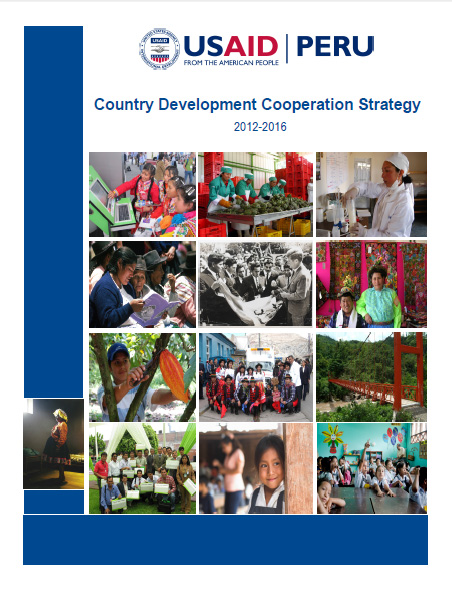This Country Development Cooperation Strategy (CDCS) reflects a long history of close development cooperation between the U.S. Government (USG) and the Government of Peru (GOP).
Peru - Country Development Cooperation Strategy ![]() (pdf - 6 MB)
(pdf - 6 MB)
On September 22, 2010, President Barack Obama signed a Presidential Policy Directive on Global Development. This policy directive marked the first time a U.S. Administration has formally addressed the significance of international development for U.S. national security and as “a strategic, economic, and moral imperative for the United States.” It also charges USAID with leading the formulation of results-oriented country development strategies that will help host countries to be more stable and prosperous.
During his March 2011 speech in Santiago, Chile, President Obama addressed U.S. foreign policy towards Latin America. He outlined the three most important issues facing the region where the United States has a shared responsibility: (1) security (specifically crime and drug trafficking); (2) economic growth; and (3) the environment (global climate change).
This Country Development Cooperation Strategy (CDCS) reflects a long history of close development cooperation between the U.S. Government (USG) and the Government of Peru (GOP). During the five decades that USAID has provided development assistance, Peru has made tremendous progress, notwithstanding setbacks attributed to hyperinflation, terrorism, natural disasters, and other political and economic challenges. The benefits of these joint USG-GOP investments include reduced maternal and infant mortality rates, more effective and accountable democratic institutions, and sustained, robust economic growth. The challenge now is to consolidate and sustain Peru’s development progress through targeted cooperation, leading to repositioning USAID’s role within the next ten years. This document outlines the development priorities and strategy that USAID/Peru has identified in order to achieve the goals laid out in President Obama’s Policy Directive; address all three foreign policy priorities for Latin America; increase the Mission’s focus on equal partnership and shared responsibility with the GOP; and help Peru sustain and capitalize on the progress and development realized over the last ten years.
Development Challenge: Despite a decade of impressive economic growth and democratic progress, many Peruvians—particularly outside of the coastal urban areas—have yet to see tangible benefits from these advances. Many feel that they receive few or inadequate basic services from the government and have not seen their incomes increase commensurate with the country’s growing economy. This perceived disparity between the economic “boom” of the coastal areas and continued poverty in Peru’s mountain and jungle regions has, in some cases, fostered a sense of social, economic, and political exclusion. To strengthen democracy and maintain trade-led economic growth, Peru must broaden economic opportunities and strengthen government capacity to provide social services in environmentally sensitive and coca-vulnerable areas. Otherwise, illegal activity (e.g., drug trafficking and illegal logging/mining), environmental degradation, and conflicts (mostly related to natural resources, the extractive industries, and terrorism fueled by narcotics trafficking) might weaken Peru’s potential future economic growth and democratic consolidation. The CDCS Goal is that Peru’s stability and democracy are strengthened through increased social and economic inclusion and reductions in illicit coca cultivation and the illegal exploitation of natural resources.
President Ollanta Humala ran on a campaign of social and economic inclusion of all Peruvians. Broader inclusion is realized when all citizens have the opportunity and resources necessary to fully participate in the economic, social, and political life of the society in which they live.1 Social and economic exclusion relate to the alienation or disenfranchisement of segments of the population from society at large. Since assuming the Presidency in July 2011, President Humala and his Administration have focused their attention on programs that improve the quality of life of marginalized populations, such as the very young, the elderly and the poor. USAID’s strategy will support the Humala Administration’s social inclusion goals.









Comment
Make a general inquiry or suggest an improvement.